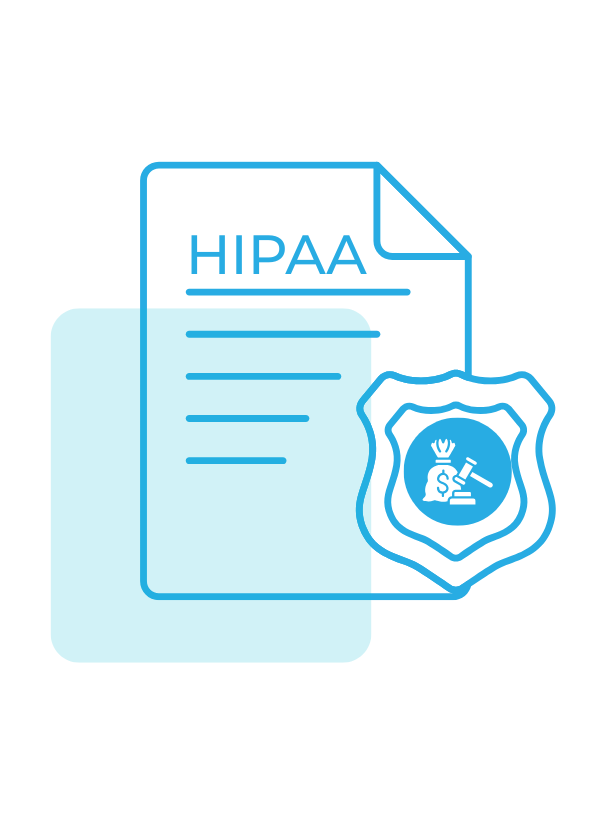What Are The Penalties for HIPAA Violations





When HIPAA was enacted in 1996, the first set of penalties that were established were not properly enforced and were not strong enough to deter HIPAA violations. It was with the HITECH Act in 2009 and the passing of the HIPAA Breach Notification Rule that the penalties were strengthened. Since then, HIPAA violations of all kinds are closely tracked and heavily fined by the OCR.
On this page, we help clinics understand the scope of these penalties, the HIPAA rules that define them, and how they can be prevented.
What Are HIPAA Noncompliance Penalties?
HIPAA noncompliance penalties are financial fines and legal consequences imposed when a covered entity or business associate fails to comply with HIPAA regulations. These penalties are designed to enforce accountability and deter organizations from mishandling Protected Health Information (PHI).
HIPAA violation fines can range from $100 per violation to over $1.5 million per year, depending on the level of negligence, intent, and whether corrective action was taken.
Types of HIPAA Violations
When a covered entity or business associate fails to comply with one or more of the HIPAA rules, it becomes a HIPAA violation. They are most commonly linked to accidental or wilful disclosure of Protected Health Information (PHI), lapses in employee training, failure to comply with the physical, administrative, or technical safeguards, or lapses in reporting breaches.
The OCR groups the causes for HIPAA violations into three categories – accidental, negligent, and willful neglect. Depending on the cause they are classified as a Civil violation or a Criminal violation.

HIPAA Civil Penalties
Civil HIPAA noncompliance penalties typically apply when violations result from insufficient safeguards, poor training, or failure to follow documented policies. The OCR levies heavy fines on covered entities and business associates for civil violations of the HIPAA rules. Based on the reason for violation and the impact of the breach, they are further classified under four tiers. Here’s an updated table of information on the different tiers of violations and the fines imposed for each.
| Tiers | Description | Penalty Per Violation | Annual Cap |
| Tier 1 | Lack of knowledge (unintentional) | $100 – $50,000 | $25,000 (adjusted for inflation) |
| Tier 2 | Reasonable cause (not wilful neglect) | $1,000 – $50,000 | $100,000 |
| Tier 3 | Wilful neglect (corrected within 30 days) | $10,000 – $50,000 | $250,000 |
| Tier 4 | Wilful neglect (not corrected) | $50,000+ | $1.5 million |
HIPAA Criminal Penalties
Criminal penalties for HIPAA noncompliance apply when individuals knowingly misuse or disclose PHI for personal, financial, or malicious gain. Tracked by OCR and enforced by the DOJ, HIPAA criminal violations carry heavy fines and, in some extreme cases, prison sentences. The penalties here are much stronger, as these HIPAA violations usually stem from wilful acts of misconduct or disclosure of PHI for personal gain.
Category | Description | Penalty |
Category 1 | Deliberate violation of HIPAA rules | Upto 1 year in jail and $50,000 in fine |
Category 2 | Obtaining PHI under false pretences | Upto 5 years in jails and $100,000 in fine |
Category 3 | Violations with intent to sell or use PHI for personal gain | Upto 10 years in jails and $250,000 in fine |
How HIPAA Violation Fines Are Enforced
HIPAA violation fines are enforced by the Office for Civil Rights within the U.S. Department of Health and Human Services. In cases involving criminal misconduct, enforcement may also involve the Department of Justice.
Penalties are determined based on investigation findings, risk assessments, breach impact, and an organization’s compliance history. Both organizations and individuals can be held liable, depending on who caused or failed to prevent the HIPAA violation.


How to Avoid HIPAA Breach Penalties
In the majority of cases, HIPAA violations are a result of carelessness or a lack of complete knowledge of the HIPAA rules and regulations. With the right HIPAA Training for staff and use of secure HIPAA-compliant communication tools, healthcare clinics and businesses can easily avoid most of these violations and stay in compliance. Here are some other ways you can avoid violations.
- Conduct annual risk assessments
- Update BAAs with vendors and service providers
- Encrypt all PHI in storage and transit
- Limit PHI access based on job roles
- Implement access control and audit logging
- Develop a breach response plan
- Secure physical and digital infrastructure
Frequently Asked Questions About HIPAA Breach Penalties
One of the most common reason organizations end up facing HIPAA violation fines is everyday communication habits. Clinics often use regular email, text messages, or file-sharing tools that aren’t secure enough to handle patient information. These small shortcuts can easily lead to unintentional and unauthorized disclosures of PHI. Another major reason is skipping or delaying risk assessments. In many enforcement cases, the OCR points to long-standing issues that were never addressed, which significantly increases HIPAA noncompliance penalties.